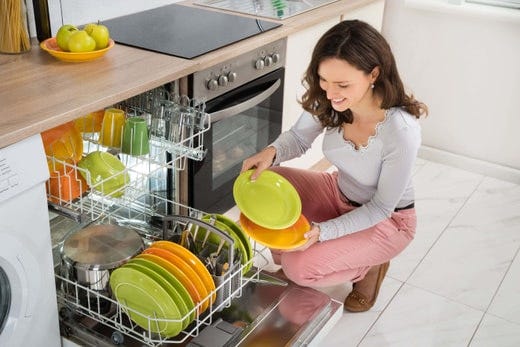Common Mistakes to Avoid When Using Dishwasher Salt
Welcome to the World of Dishwasher Salt!
Are you aware that dishwasher salt plays a crucial role in preserving your dishwasher's peak performance? Wondering how? It prevents the accumulation of limescale in your dishwasher, which can hinder heat transfer and water flow, resulting in reduced cleaning and drying efficiency.
Using dishwasher salt, you can effortlessly prevent limescale buildup, resulting in a flawlessly clean and highly efficient dishwasher.
In addition, it also softens water to ensure better cleaning performance of your detergent, preventing white residue marks from hard water on your glasses and dishes.
This comprehensive guide delves into the typical errors to avoid when using dishwasher salt, ensuring peak performance.
Understanding the purpose of dishwasher salt
Before delving into the typical errors, let's grasp the significance of dishwasher salt. It serves two primary purposes: firstly, it helps prevent the accumulation of limescale in your dishwasher, and secondly, it aids in effectively softening the water.
This, in turn, ensures enhanced cleaning performance of your detergent and prevents unsightly white residue marks caused by hard water on your glasses and dishes.
Mistakes to avoid when using dishwasher salt
1. Neglecting to add dishwasher salt: The empty reservoir dilemma
Low salt usage can result in inadequate water softening and accumulating limescale, which can adversely impact the efficiency and lifespan of your appliance. It is essential to regularly replenish the salt reservoir to prevent this issue and ensure the seamless operation of your dishwasher.
2. Using the wrong type of salt
One of the most common mistakes people often make is using the wrong dishwasher salt; by that, we mean using table salt in the dishwasher. Table salt and dishwasher salt differ in their granule size and additives.
Unlike table salt, dishwasher salt granules are specifically designed, larger than the regular salt, to dissolve slower, not to block the water softener unit. Table salt may also contain additives, such as iodine, sodium ferrocyanide, or calcium silicate, which can contribute to limescale build-up.
Dishwasher salt, composed of pure sodium chloride, regenerates the water-softening system's ion exchange resin. This resin eliminates hardness-causing minerals like calcium and magnesium ions from water.
Using pure sodium chloride, the resin can efficiently exchange sodium ions for hardness minerals, guaranteeing effective water softening and preventing limescale accumulation in the dishwasher.
When selecting various options, consistently opt for the globally recognized dishwasher salt that offers outstanding and dependable prevention against limescale buildup and the formation of white residue marks caused by hard water.
3. Overfilling or underfilling the salt reservoir: striking the right balance
Achieving the correct fill level in the salt reservoir is essential for maximizing your dishwasher's performance.
Pouring in too much salt can lead to water inside the reservoir overflowing and spilling inside the appliance and potentially damaging the dishwasher, while underfilling the salt can lead to limescale build-up on the filter.
It's important to strike the perfect balance by adhering to the manufacturer's guidelines, ensuring a healthy salt level in the reservoir.
4. Failing to check salt levels: A recipe for limescale disaster
Failing to check the salt levels in your dishwasher regularly can lead to a limescale disaster waiting to happen.
Insufficient salt levels compromise the effectiveness of the water softener, allowing limescale to build up over time and affect the cleaning performance of your dishwasher.
Make it a habit to check and replenish the salt levels to avoid the unwanted surprise of limescale accumulation.
5. Not regularly cleaning the salt reservoir: Maintenance matters
Neglecting the proper cleaning of the salt reservoir can affect your dishwasher's performance. Over time, salt residue and impurities can accumulate, leading to system clogs and impairing water-softening capabilities.
Consistently upkeeping the cleanliness of the salt reservoir, prioritizing clog prevention and unclogging, guarantees optimal functionality, averts blockages, and preserves the dishwasher's efficiency.
Final thoughts
You can maintain your dishwasher's performance by avoiding the common mistakes discussed in this article and implementing our expert tips.
Don't let limescale buildup compromise the cleanliness of your dishes. With proper use of dishwasher salt and regular maintenance, you'll enjoy the best results and prolong the life of your dishwasher.
FAQs
What happens if I don't use dishwasher salt in my dishwasher?
Not using dishwasher salt in your dishwasher can lead to limescale build-up on utensils, clog the internal mechanisms and pipes, reduce water flow, decrease cleaning effectiveness, and potentially damage your appliance.
What are the consequences of using the wrong type of salt in my dishwasher?
Using the wrong type of salt in your dishwasher can increase water hardness, limescale buildup, and white residue marks and impair cleaning performance.
How much dishwasher salt should I add to the salt reservoir?
The amount of dishwasher salt required depends on the size and model of your dishwasher. Consult the manufacturer's instructions for your dishwasher model to determine the appropriate amount of salt.
However, pour enough dishwasher salt to reach the top of the reservoir. While this might seem like quite a lot of salt, it's the right amount to add.
.png?width=70&height=45&format=png&quality=50)
